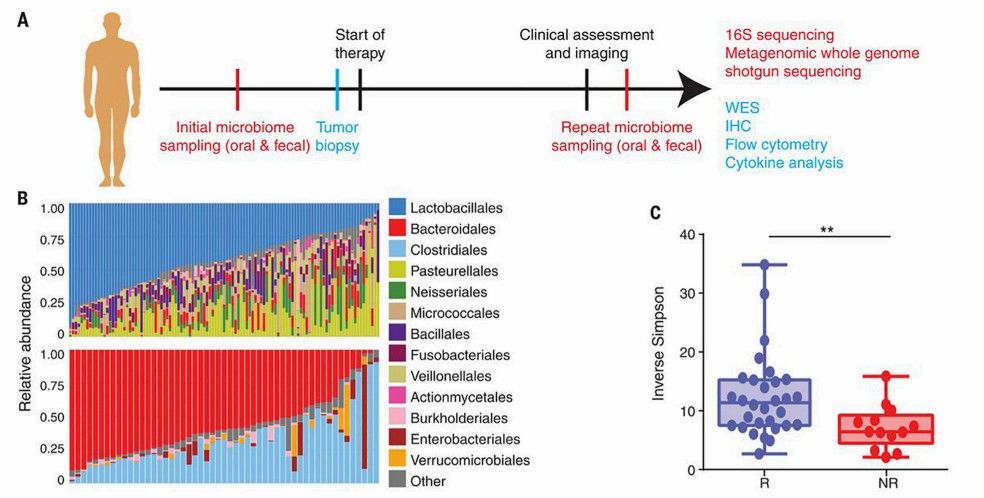Creative Biolabs is here to provide you with a comprehensive introduction to the impact of the microbiome on the host immune system, particularly in the process of immune checkpoint blockade, and provide theoretical support in order to facilitate your selection and exploration of rational pathways that enhance immunotherapeutic efficacy while concurrently mitigating toxicity.
The composition and population diversity of the symbiotic gut microbiota have various effects on the immune system, and their impact on ICB tumor intervention and autoimmune side effect spectrum has been partially elucidated:
 Fig 1. A certain correlation between patients' microbiome and the effect of anti-PD-L1.1
Fig 1. A certain correlation between patients' microbiome and the effect of anti-PD-L1.1
The relationship between ICB response variability and symbiotic gut microbiota has been validated by numerous experiments. However, further prospective research is still needed for its effective and safe application. Currently, the use of gut microbiota as an intervention and prediction tool still faces the following challenges:
Title: Gut microbiome modulates response to anti-PD-1 immunotherapy in melanoma patients.
Research Objective:
Characterize the correlation between gut microbiome and tumor response to ICB in human cancer patients.
Methodology:
Perform metagenomic and relative abundance analysis of gut and oral microbiome in melanoma patients receiving anti-PD-1 immunotherapy to characterize their diversity and composition.
Research Findings:
Patients with high gut microbiome diversity in the fecal microbiome exhibit significant prolongation of progression-free survival. Patients responding to immune suppression measures have higher α-diversity and relative abundance of bacteria from Ruminococcaceae, along with enrichment of synthetic metabolic pathways and functional differences. These results demonstrate the potential involvement and regulation of the gut microbiome in the response of melanoma patients to PD-1 immunotherapy.
In addition to furnishing comprehensive theoretical support, Creative Biolabs proudly offers an all-encompassing suite of top-tier services pertaining to immune checkpoint blockade. Our distinguished repertoire encompasses a spectrum of avant-garde provisions meticulously designed to cater to the discerning requirements of our esteemed clientele. Don't hesitate to contact us to explore the infinite possibilities of immune checkpoints.
All listed customized services & products are for research use only, not intended for pharmaceutical, diagnostic, therapeutic, or any in vivo human use.
USA
Tel:
Fax:
Email:
Copyright © 2026 Creative Biolabs. All Rights Reserved.